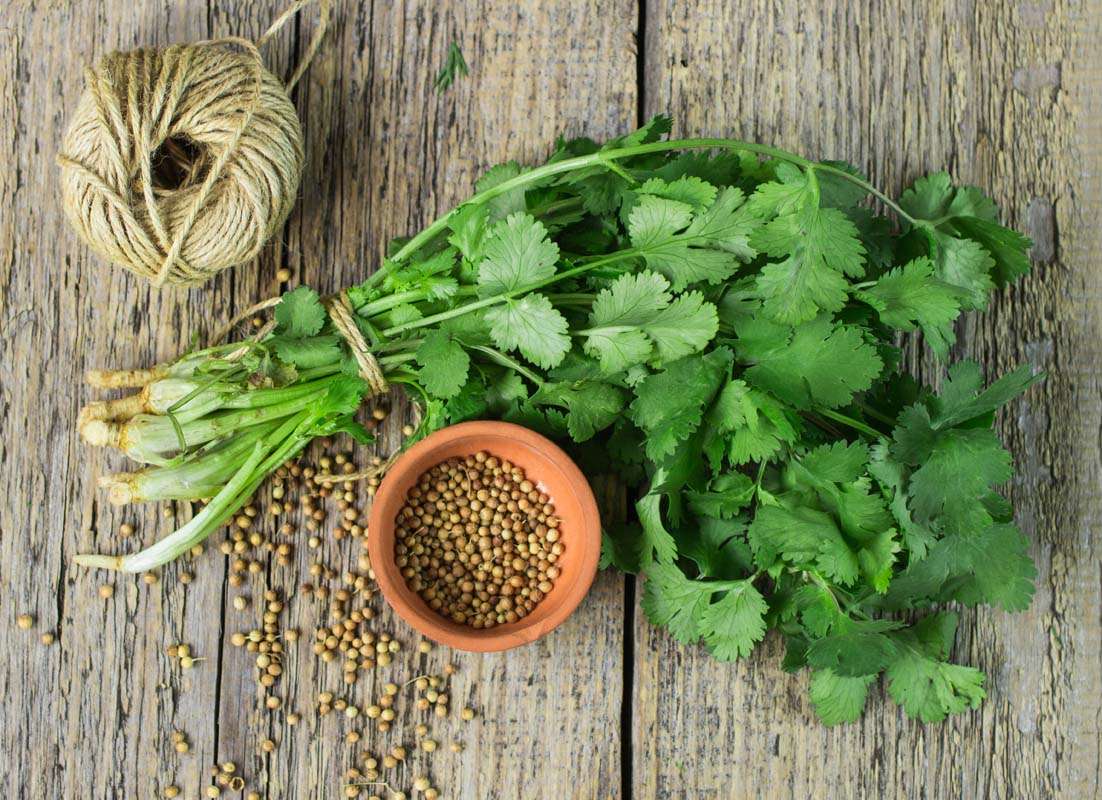Oregano, a natural antibiotic and immune booster
Oregano, a natural antibiotic and immune booster
Oregano is a powerful herb, high in antioxidant compounds, which can neutralize the harmful effects of free radicals to prevent cancer.
One of the most popular herbs is oregano. It is used not only as a flavor enhancer for foods but also as a supplement and an aromatic oil. The antioxidants in this herb contribute to its strong flavor and aroma.
The oregano spice includes various plant species. The most common are the genus Origanum, native of Europe, and the Lippia, native of Mexico. Among the species of Origanum. Their most important components are the limonene, gamma-cariofilene, rho-cymenene, canfor, linalol, alpha-pinene, carvacrol and thymol. In the genus Lippia, the same compounds can be found. The oregano composition depends on the specie, climate, altitude, time of recollection and the stage of growth. Some of the properties of this plant's extracts are being currently studied due to the growing interest for substituting synthetic additives commonly found in foods. Oregano has a good antioxidant capacity and also presents antimicrobial activity against pathogenic microorganisms like Salmonella typhimurium, Escherichia coli, Staphylococcus aureus, Staphylococcus epidermidis, among others. These are all characteristics of interest for the food industry because they may enhance the safety and stability of foods. There are also some reports regarding the antimutagenic and anticarcinogenic effect of oregano; representing an alternative for the potential treatment and/or prevention of certain chronic ailments, like cancer.
Unlike oregano leaves (fresh or dried), there is limited research into the medicinal uses of oregano. Most research into oregano uses oregano extract or oregano essential oil. Through research, they advise people to use oregano oil in cooking, but they should never ingest oregano essential oil as it can be toxic.
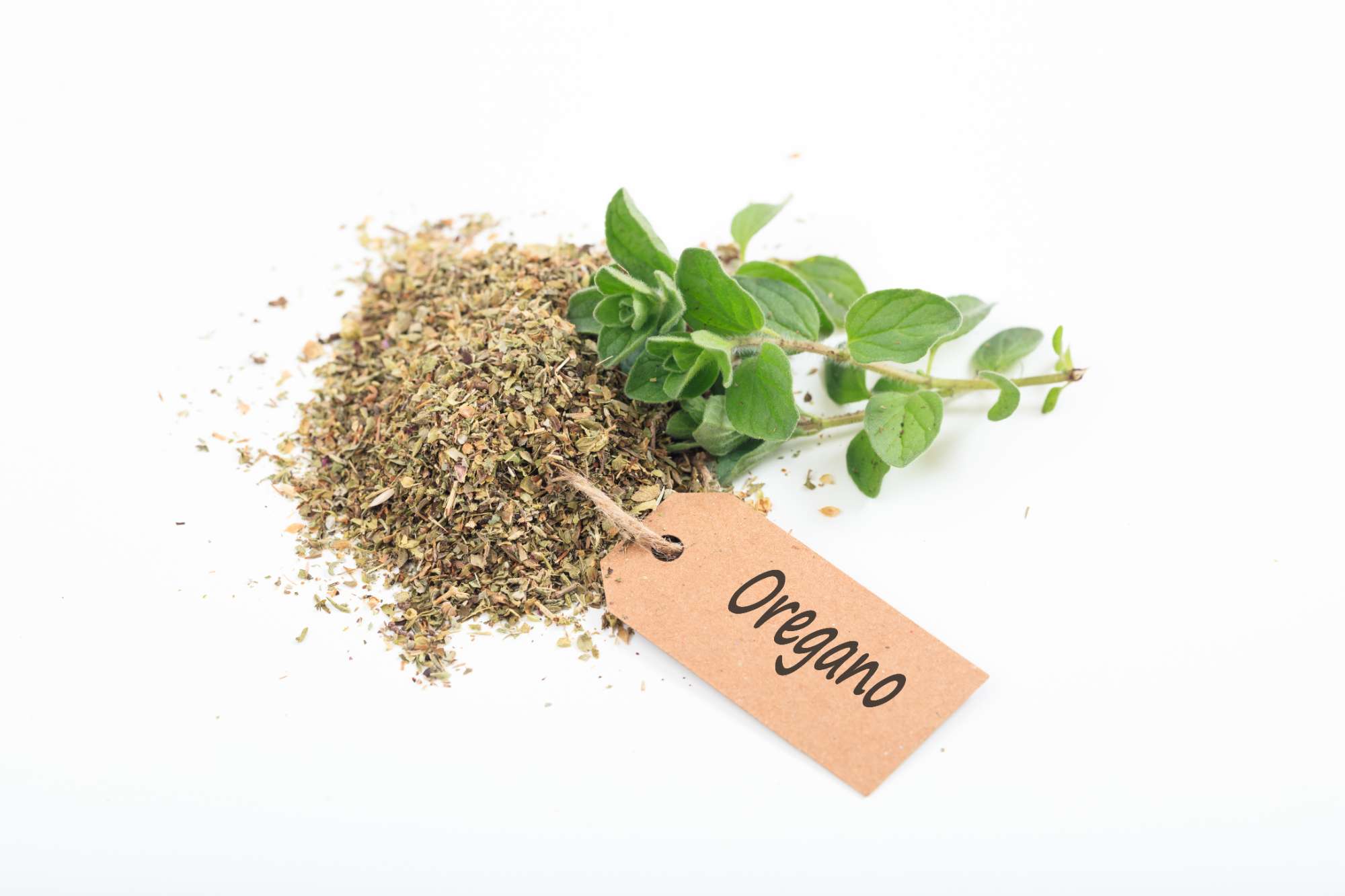
NUTRITION FACTS
There are many types of oregano, and the antioxidant and nutrient content can vary widely. The below shows nutrition facts in 1 tbsp, leaves of oregano (3g)
- Calories: 8
- Saturated Fats: 0.1g, 0.2%DV
- Sodium: 1mg, 0%DV
- Carbs: 2g, 1%DV
- Net carbs: 1g
- Fiber: 1g, 5%DV
- Sugar: 0.1g
- Protein: 0.3g
- Calcium: 48mg, 5%DV
- Iron: 1mg, 14%DV
- Potassium: 38mg, 1%DV
- Alpha carotene: 1μg
- Beta carotene: 30μg
- Choline: 1mg, 0.2%
- Copper: 0mg, 2%
- Folate (B9): 7μg, 2%
- Magnesium: 8mg, 2%
- Manganese: 0.1mg, 7%
- Niacin: 0.1mgv1%
- Pantothenic acid: 0mg, 1%
- Phosphorus: 4mg, 1%
- Riboflavin (B2): 0mg, 1%
- Seleniumv0.1μg, 0.2%
- Thiamine: 0mg, 0.4%
- Vitamin A IU: 51IU
- Vitamin A: 3μg, 0.3%
- Vitamin B6: 0mg, 2%
- Vitamin C: 0.1mg, 0.1%
- Vitamin E: 1mg, 4%
- Vitamin K: 19μg, 16%
- Zinc: 0.1mg, 1%
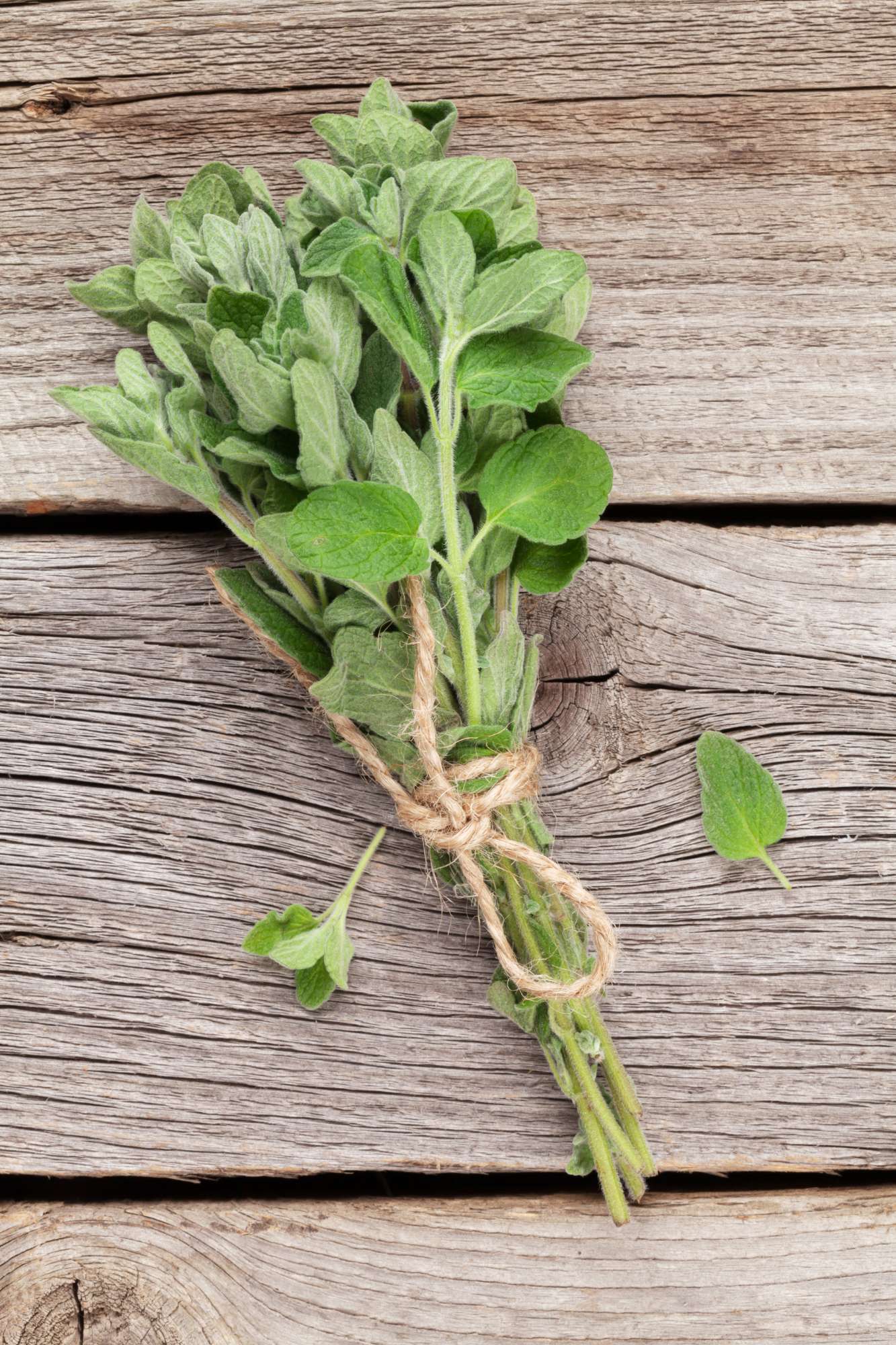
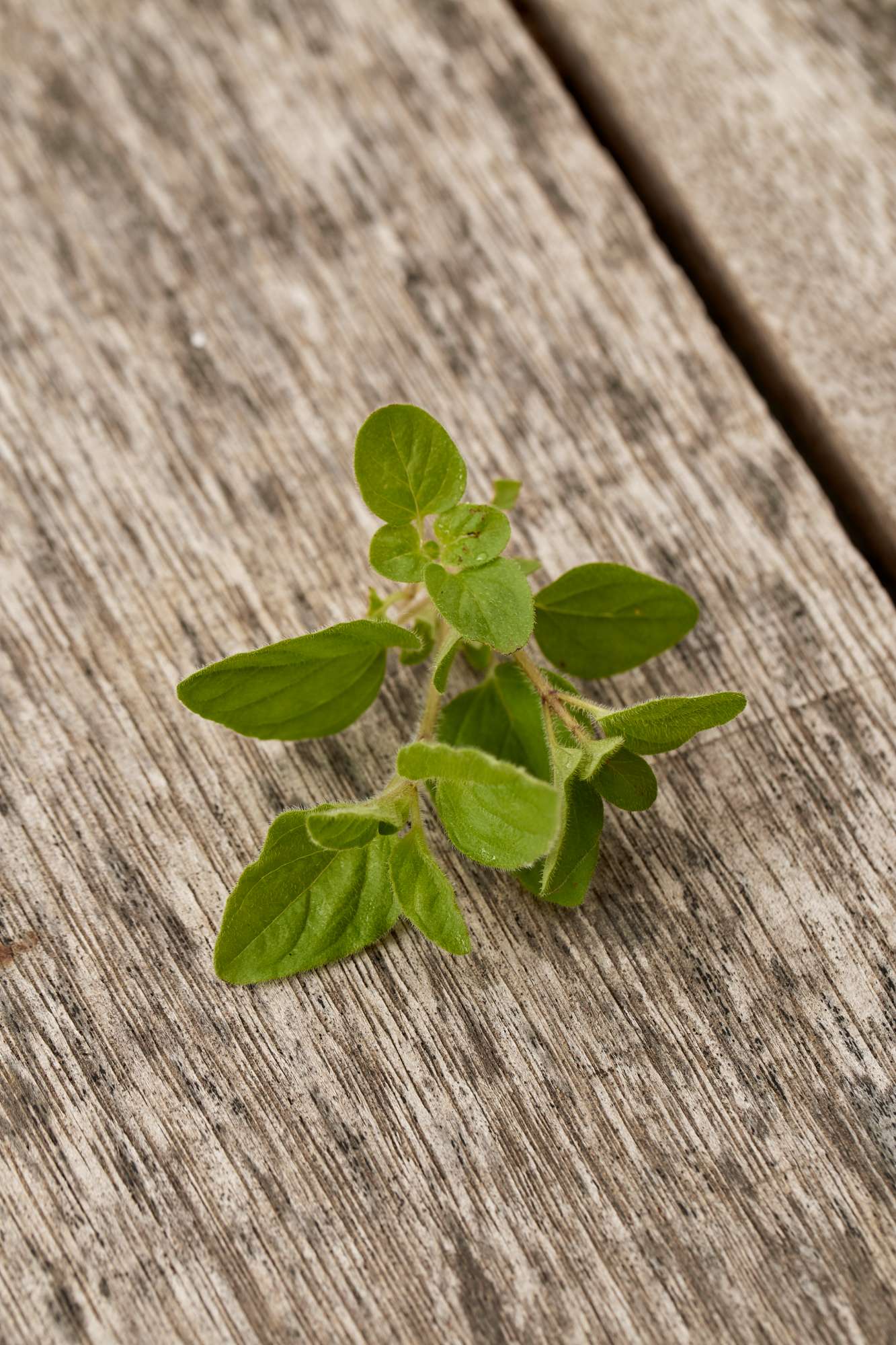
HEALTHY BENEFITS
1. Rich in Antioxidants
Oregano is rich in antioxidants that can fight damage from harmful free radicals in the body by neutralizing them. These compounds include Phenolics (which may perform antimicrobial, antioxidant, anticancer, and anti-inflammatory activities); Terpenes; Flavonoids; steroids; and Tannins (which have antioxidant properties).
Free radicals arise from natural processes and environmental stress. The buildup of free radicals can cause oxidative stress, which can lead to cell damage that may result in various diseases, including heart disease and cancer.
Oregano as a standalone herb cannot singlehandedly produce these results. In combination with other high-antioxidant foods like fruits and vegetables, oregano could provide a hearty dose of antioxidants that may help improve your health.
2. Anti-Cancer Properties
Oregano is high in antioxidants. These compounds can not only neutralize free radical damage, but they may also aid in cancer prevention.
Some test-tube studies have shown that oregano and its components may help kill cancer cells. One test-tube study treated human colon cancer cells with oregano extract and found that it stopped the growth of cancer cells and helped kill them off. Another test-tube study showed that carvacrol, one of the components in oregano, also helped suppress the growth and spread of colon cancer cells.
However, keep in mind that these were test-tube studies using high amounts of the herb and its compounds. Human studies using typical doses are needed to determine its effects.
3. Antimicrobial properties
The compounds carvacrol and thymol are found in oregano essential oil. These compounds have strong antibacterial properties.
In a 2019 laboratory study, carvacrol and thymol prevented various strains of Staphylococcus aureus (S. aureus) bacteria from developing in meat and dairy products, suggesting that it could help control bacterial growth in foods. However, further research into the topic is necessary.
A 2018 study investigated the effects of oregano oil on various microbes that do not respond to other drugs in a laboratory setting. The study authors noted that the oil showed “significant antibacterial activity” against 11 such microbes, suggesting that substances in oregano could play a role in combatting antibiotic resistance.
While these tests indicate that compounds in oregano may have antimicrobial properties, it does not mean that eating oregano will prevent infections.
4. Reduce Viral Infection
In addition to fighting off bacteria, carvacrol and thymol are two compounds found in oregano that have been shown to decrease the activity of viruses.
In one test-tube study, carvacrol inactivated norovirus, a viral infection that causes diarrhea, nausea, and stomach pain, within one hour of treatment. Another test-tube study found that thymol and carvacrol inactivated 90% of the herpes simplex virus within one hour.
While these results are promising, additional research on how oregano may impact viral infections in humans is needed.
People use oregano for wound healing, parasite infections, and many other conditions, but there is no good scientific evidence to support these uses.
5. Anti-inflammatory properties
Inflammation is a normal immune response that occurs as a result of illness or injury. However, chronic inflammation is believed to contribute to the development of diseases like heart disease, diabetes and autoimmune conditions.
Oregano is rich in antioxidants and also contains compounds like carvacrol, which can help neutralize free radicals and reduce inflammation.
A 2020 study found that oregano essential oil may have anti-inflammatory and wound-healing activity in human keratinocytes. Keratinocytes are a type of skin cell that helps protect the outer layer of skin from infection and environmental damage. However, it should be noted that this was an in-vitro study, so the findings may not be replicable outside of a laboratory setting.
6. Anti-diabetic properties
A 2022 review stated that while some previous research has suggested that oregano may have anti-diabetic effects, most of this research was in vitro. Therefore, further studies into this topic are necessary.
A 2021 in-vitro study found that oregano extract could lower blood sugar (glucose) through several different mechanisms, such as improving glucose uptake from the blood into cells and inhibiting the activity of an enzyme that promotes the breakdown of carbohydrates into glucose.
Similarly, some older rodent studies have suggested that compounds in oregano may help manage diabetes. However, findings from animal studies are not always applicable to humans.
Authors of an older 2016 rodent study concluded that Origanum extract may help:
- Improve insulin resistance
- Regulate the expression of genes that affect fat and carbohydrate metabolism
- Restore damaged liver and kidney tissues
They noted that some people already use oregano leaves and oil to manage high blood sugar levels.
In 2015, researchers found that an extract of oregano improved type 1 diabetes in mice. They suggested this could be due to oregano’s antioxidant properties, its effect on the immune system, and its ability to prevent cell death.
7. Managing stress
Rodent studies have suggested that oregano may improve stress-related behavior. However, further research is necessary to determine if these findings apply to humans.
A 2022 study on male rats investigated the effects of oregano on anxiety-like behavior and learning and memory dysfunction caused by chronic unpredictable stress (CUS). The authors concluded that oregano may alleviate anxiety-like behaviors and improve learning and memory impairment. Similarly, in 2018, scientists looked at how treatment with oregano essential oil and other substances affected rats with depression due to CUS.
After 14 days, depressive symptoms caused by CUS improved in rats that received the oregano treatment. The study authors concluded that oregano might relieve stress-related behavior.
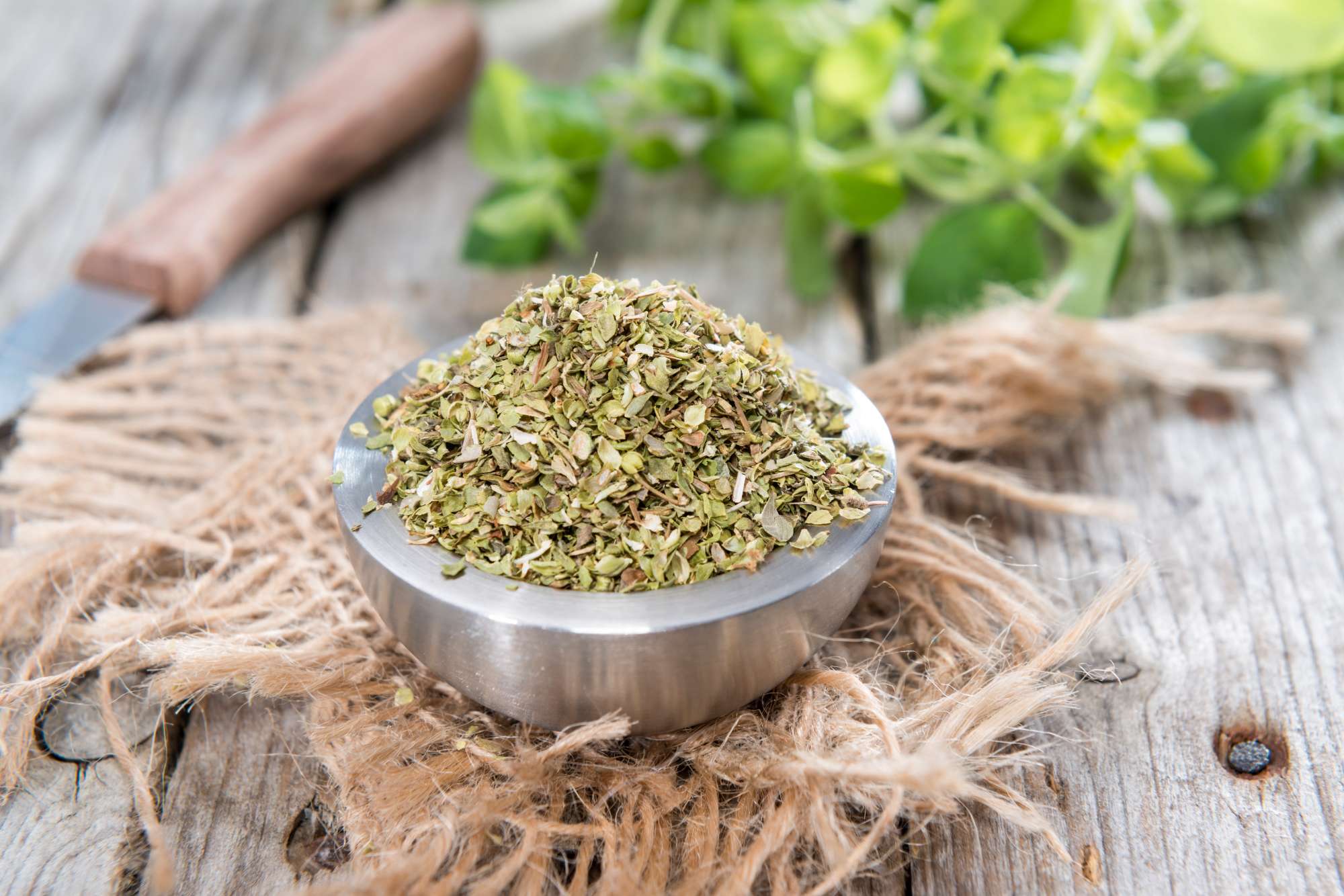
SIDE EFFECTS
When taken by mouth: Oregano leaf and oregano oil are likely safe when eaten in foods. There isn't enough reliable information to know if oregano is safe to use in amounts greater than those found in food. Mild side effects include stomach upset.
When applied to the skin: There isn't enough reliable information to know if oregano oil is safe to apply to the skin. It may cause irritation when applied in concentrations greater than 1%.
RISKS
Oregano, as an herb, oil, or supplement, is likely to be safe for most people. However, people should:
- Ask their doctor before starting any supplement, especially if they are taking other medications or have a medical condition.
- Avoid oregano products for 2 weeks before surgery, as it can increase the risk of bleeding.
- Dilute essential oils before use, either with a carrier oil, such as olive oil, or in water, as for a steam bath. The concentration of oregano oil should be no more than 1%, or skin irritation may occur.
It can be dangerous to swallow essential oils or apply them to the skin. People should check the correct way to use each product to prevent toxicity.
Oregano may affect the body’s ability to absorb copper, iron, and zinc. It may also lower blood sugar and slow blood clotting, which increases the risk of bleeding.
People with an allergy to plants belonging to the Lamiaceae family, which include oregano, basil, lavender, mint, and sage, should take care, as they may also develop an allergic reaction to oregano.
Pregnant people should also take care when using oregano, as large amounts may cause miscarriage. Similarly, nursing individuals should avoid consuming large amounts of oregano.
Unless someone is allergic to oregano, none of the other risks above apply to dried or fresh oregano leaves used in cooking as an herb.
IMPORTANT NOTE
While oregano offers numerous potential health benefits, it's important to remember that most of the research has been done in test tubes or on animals.
1. More human studies are needed to fully understand the effects of oregano on human health. Oregano oil, in particular, should be used with caution as it is very potent and can cause skin irritation if not diluted properly.
2. Always consult with a healthcare professional before using oregano oil or any herbal supplement, especially if you are pregnant, breastfeeding, or taking medications.
Compiled and written by Crocus Media
Products

Extra Virgin Coconut Oil By Cold Press
At a temperature below 25 degrees Celsius, extra virgin coconut oil begins to solidify, which is the physical effect and does not affect the product’s quality.
References
What are the health benefits of oregano?
Oregano: properties, composition and biological activity
Antimicrobial activity of essential oils of cultivated oregano (Origanum vulgare)
Antioxidant actions of thymol, carvacrol, 6-gingerol, zingerone and hydroxytyrosol
Essential Oils of Oregano: Biological Activity beyond Their Antimicrobial Properties.
The Effects of Continual Consumption of Origanum vulgare on Liver Transcriptomics
Flavonoids and Phenolic Acids from Oregano: Occurrence, Biological Activity and Health Benefits.
Chronic inflammation and oxidative stress as a major cause of age-related diseases and cancer
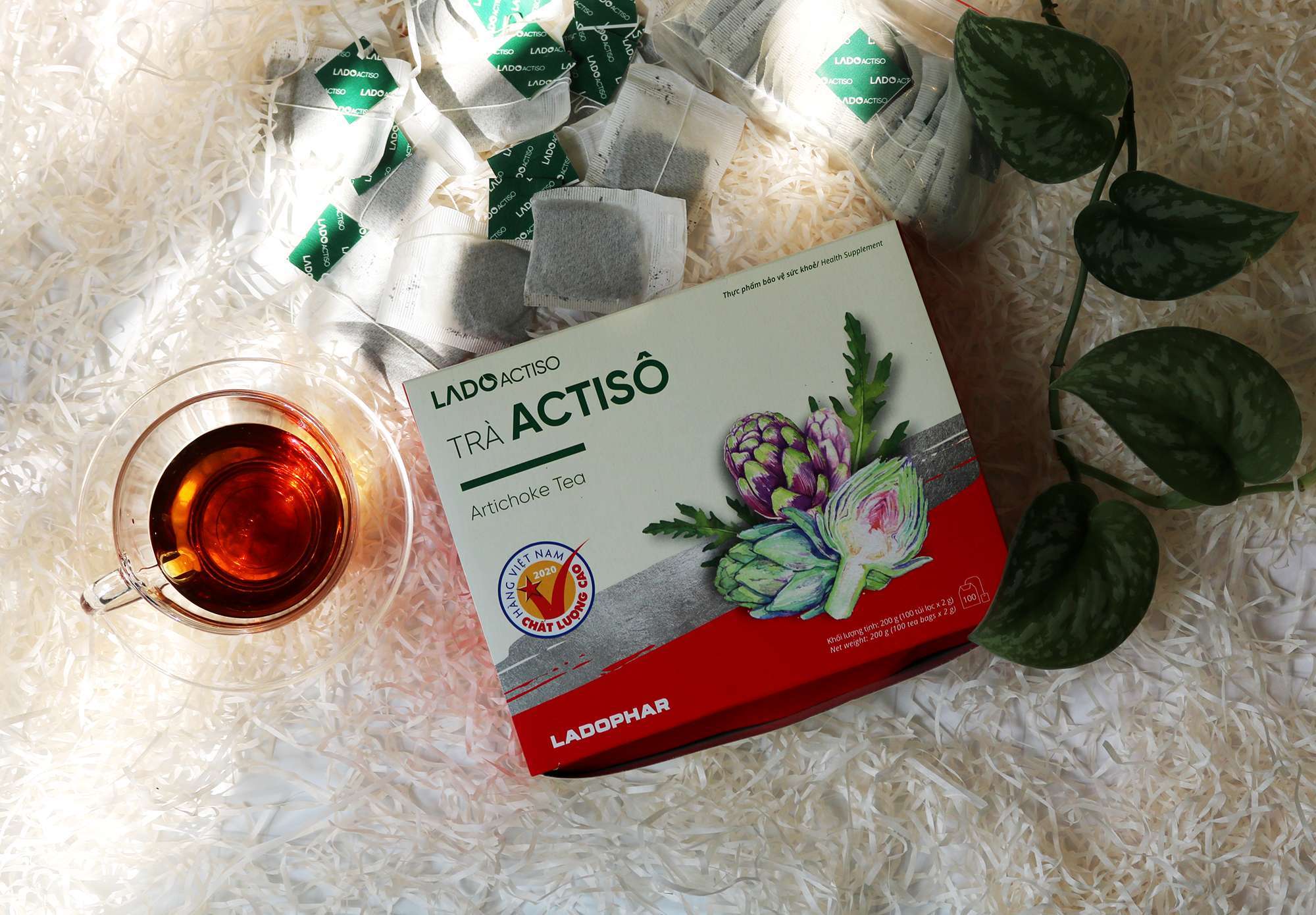


.jpg)
